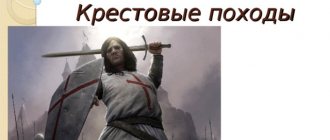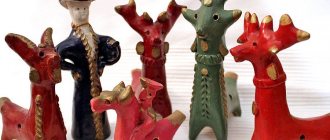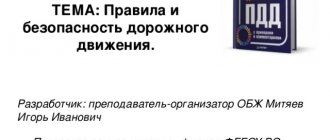Presentation for the lesson “The Emergence of the Mongol Empire. The conquests of Genghis Khan and his descendants"
#6th grade #History #Educational and methodological materials #Material on teaching materials #Subject teacher #School education #Teaching and teaching materials by A. V. Torkunova
“History is not a kind teacher, but a strict overseer who cruelly punishes for unlearned lessons” V.O. Klyuchevsky
There was a terrible age when the Mongols came to Rus' like an avalanche, On an autumn day, across the bare steppe, Trampling dry feather grass. So the Mongol horde marched in a monstrous stream towards Rus' in one cruel desire to burn and plunder cities. There was a terrible age when the Mongols came to Rus' like an avalanche, On an autumn day, across the bare steppe, Trampling dry feather grass. So the Mongol horde marched in a monstrous stream towards Rus' in one cruel desire to burn and plunder cities.
Lesson topic: “The emergence of the Mongol Empire. The conquests of Genghis Khan and his descendants" History of Russia, 6th grade
Homework: Paragraph 15 Questions and assignments on page 11. Workbook No. 2,3,5 Rubric “We think, compare, reflect.” (page 11). Task No. 1, 3 (presentation)
Plan: 1. Formation of the power of Genghis Khan. 2. The beginning of Genghis Khan’s campaigns of conquest. 3. Battle of Kalka. 4. Historical heritage of the Mongol Empire.
Problematic question! (p. 4) What consequences did the Mongol conquests and the formation of the Mongol Empire have for the various countries and peoples of Eurasia?
1. Formation of the power of Genghis Khan. 1. Formation of the power of Genghis Khan.
Mongols In the second half of the XII - early XIV centuries. Numerous Turkic tribes, including Mongols and Tatars, lived in vast areas from the Great Wall of China to Lake Baikal. The Mongols gave the name to this entire tribal union, and then to the state. In Rus' they began to be called Tatars, and the name Mongol-Tatars was fixed in history.
Mongol-Tatars Main occupation - cattle breeding Main wealth - herds of horses, herds of cattle Constant struggle for pastures Since childhood, they sat in the saddle and owned weapons.
Mongols Among the Mongolian tribes, tribal relations died out, private property appeared, and the state was born. But the Mongols were about four centuries behind in their development compared to Russia. Feudal relations arose in Mongolian society. The measure of wealth, power and influence here were livestock and pastures. The Mongols were nomadic and did not build cities.
Genghis Khan In the middle of the 12th century, one of the khans managed to subjugate most of the Mongol tribes. But he soon died at the hands of assassins. His eldest son, Temujin managed to assemble a new squad. From this he began his journey upward. In a desperate struggle, he managed to bring the bulk of the Mongol tribes under his control and take the throne of all the Mongols.
Temujin was born in February 1155, on the banks of the Onon River, in the Delyun-Boldoh tract. At the age of nine, he lost his father. He spent several years in slavery. He believed that the happiest person on earth is the one who drives away the enemies he defeated, robs their property, rides their horses, admires the tears of people close to them.
Temujin (Genghis Khan) years of life 1155 - August 18, 1227.
Genghis Khan In 1206, at the Kurultai, Temujin was proclaimed Genghis Khan of a unified Mongol state. Strict laws were introduced in the state, which were called “Yasa”. Genghis Khan managed to create one of the most powerful armies in Asia, which no one could resist. ? Why?
Mongols From the very beginning, Mongolian statehood was militarized. The khans took full advantage of the military dexterity of the Mongols, their ability for fast and long-distance movements in the saddle and in wagons. Wars began between tribes, the rise of some khans and the fall of others. Mongol leaders dreamed of long campaigns and conquests.
Read paragraph 1 “The formation of the power of Genghis Khan, answer the question: Read paragraph 1 “The formation of the power of Genghis Khan,” answer the question: What facts indicate that the Mongol-Tatars had a state? Task 1. – pp. 4-5 10/21/19 <number>
Genghis Khan Having subjugated most of the Mongols, Temujin carried out a number of reforms. In particular, he introduced a decimal system for organizing society and the army. TENS HUNDREDS THOUSANDS OF DARKNESS KURULTAI - general congress of the Mongolian nobility Genghis Khan - great khan KURULTAI
Old Russian state Mongolian state The time of the emergence of the state in Rus'? 9th century Second half of the 12th century. When did the state emerge among the Mongol-Tatars? The main occupation of the Eastern Slavs? Arable farming The main occupation of the Mongol-Tatars? Cattle breeding Authorities in Rus'? Veche, prince, Boyar Duma. Authorities of the Mongol-Tatars? Khan, kurultai Form of government in Kievan Rus? Early feudal monarchy with elements of democracy Form of government among the Mongol-Tatars? Early feudal, militarized monarchy A period of feudal fragmentation began in Rus'.
State Organization of power in a certain territory
Great Yasa Code of laws regulating the rules of behavior and life of the Mongols
Karakorum Capital of the Mongol state
Organization of the Mongol army Army Tumen "darkness" 10,000 Tumen "darkness" 10,000 Tumen "darkness" 10,000 Thousand Thousand Thousand Thousand Hundred Hundred Hundred Tumen "darkness" 10 000 Thousand Hundred Ten Ten Ten Ten Ten
Read the document “From the “Great Yasa” of Genghis Khan Read the document “From the “Great Yasa” of Genghis Khan Working with the document, draw conclusions about the advantages of the Mongol army Task 2. – page 11 10/21/19 <number>
Each warrior had two or three bows, a rope lasso, an ax, and was good with a saber. The warrior's horse was covered with skins for protection. The warrior's head, neck and chest were protected by an iron or copper helmet and leather armor. The Mongol cavalry on their short, hardy horses could travel up to 80 km per day, and with convoys, battering rams, and flamethrowers - up to 10 km.
The core of the Mongol army was horsemen armed with a spear, bow and shield: light horsemen and heavy cavalry, capable of attacking with “iron lava” with fury and pressure. In addition, the leader had various kinds of “experts” (for example, in the field of siege warfare), mostly Chinese. However, the most important features of the Mongol army, which made it almost unique at that time, were, firstly, the ability of commanders to brilliantly coordinate the actions of detachments and columns located at a considerable distance from each other, and secondly, the amazing coherence with which Mongol commanders acted in the heat and confusion of the battle.
Conquests of the Mongols The Mongol army was strong not only with its powerful and fast cavalry, where the riders were armed with bows, sabers, spears and lassos, but also with Chinese siege battering and stone-throwing machines, and projectiles with a flammable mixture.
Advantages of the Mongol army 1. Cruelty 2. Weapons 3. Siege towers 4. Crescent tactics 5. Reconnaissance
2. The beginning of Genghis Khan’s campaigns of conquest. 2. The beginning of Genghis Khan’s campaigns of conquest.
Working with paragraph 2 “The beginning of Genghis Khan’s campaigns of conquest,” fill out the table; Working with paragraph 2 “The beginning of Genghis Khan’s campaigns of conquest,” fill out the table; Task 1. in the workbook Task 3. – page 5 10.21.19 <number>
Date Direction Consequences 1211-1215 After the Qin Empire (1216) 1219-1221 Campaigns of Genghis Khan
Karakorum 1202 1204 1211-1218 1218 1218 -1221 1223 1225-1227 Soon the Mongol war machine was working at full capacity. In 1211, Genghis Khan attacked Northern China, and in 1215 he captured the capital of the empire, Beijing. Genghis Khan put the vast scientific and cultural experience of the empire at his service. He introduced Chinese writing in his state and recruited Chinese scientists and military specialists.
Conquests of the Mongols After China, the Mongols conquered Central Asia, Northern Iran, and invaded Azerbaijan and the North Caucasus. The Polovtsian nomad camps and southern Russian steppes stretched out before them. How can we explain Genghis Khan's victories over the major Asian states?
During the Mongol conquests, Genghis Khan had excellent intelligence. The Mongols collected information about future opponents, their allies and enemies, and their defensive structures. The brutal reprisals of the Mongols against their opponents had a depressing effect on their enemies. They destroyed rebellious cities, and the inhabitants were either taken captive or exterminated.
Date Direction Consequences 1211-1215 North Chinese Empire Qin Conquest After the Qin Empire (1216) Nomadic peoples living west of the Mongols conquest 1219-1221 Central Asia, Persia conquest Campaigns of Genghis Khan
Read the document “Persian historian Rashid ad-Din on the capture of the capital of Khorezm, Urgench, by the Mongols in 1221.” Read the document “Persian historian Rashid ad-Din on the capture of the capital of Khorezm, Urgench, by the Mongols in 1221.” Working with the document, draw conclusions about the actions of the Mongol army. Task 4. – p. 11 10.21.19 <number>
3. Battle of Kalka. 3. Battle of Kalka.
Battle of Kalka Soon Mongol-Tatars appeared on the shores of the Sea of Azov. The Polovtsians, in despair, turned to the Russian princes for help, but in vain. In the princely residences they only rejoiced that the Mongols were destroying their sworn enemies. The princes believed that they could easily cope with the Mongols, as they had dealt with the Polovtsians in their time.
Battle of Kalka Mstislav Mstislavovich convened a council of princes of Southern Rus' in Kyiv. The Polovtsians convinced the Russians that if they did not help them, they themselves would soon be defeated. “It is better (for us) to accept (them) on foreign lands than on our own.” Mstislav of Kiev, Mstislav of Chernigov, Daniil of Vladimir-Volyn, Mstislav the Udal of Galich and others set out on the campaign. Prince Yuri Vsevolodovich from the Vladimir-Suzdal land refused help . But the Polovtsian cavalry joined the Russians.
Battle of Kalka The Russian princes did not succumb to the trick of the Mongols, but at the same time they themselves acted cruelly and ignoblely, killing the ambassadors. The Russian army had barely crossed the Dnieper when it was attacked by the Mongol vanguard. Before the Polovtsian request for help, they apparently had not even heard of the Mongols. “We hear that you are going against us, having listened to the Polovtsians. But we don’t need your land... They didn’t come to fight with you, but came by the will of God to fight against their slaves and grooms, against the filthy Polovtsians. You will establish peace with them, and if they run to you, beat them and take the goods for yourself, because, we heard, they did a lot of harm to you too. This is why we beat them.” What technique did the Mongols use? Evaluate the actions of the Mongols?
Fill out the table “Battle of Kalka”? Fill out the table “Battle of Kalka”? Task 5. – workbook, p. 67 10.21.19 <number>
Notebook entry: May 31, 1223 – Battle of the river. Kalka
Battle of Kalka The Mongols showered the Russians with arrows and retreated. Unaware of their usual luring tactics, the princes mistook this retreat for flight. For eight days the Russians chased an elusively mobile enemy, every now and then repelling attacks from flying Mongol troops. Finally, in May 1223 they approached the Kalka River. “In the same year, because of our sin, the Gentiles came not knowing, but no one knows their good: who they are and who is from them, and what their language is, and what tribe they are, and what their faith is. And they are called Tatars, and some say Taurmeni, and others Pechenesi... God alone knows who they are and how they are from Izidosh.”
Battle of the Kalka The Polovtsians, the squads of Mstislav the Udal and Daniil Galitsky, trying to catch up with the enemy, crossed the Kalka and came under attack from the main forces of the Mongols - heavy cavalry, the existence of which they did not even suspect. They were unable to repel the attack of the heavy Mongol cavalry. The Polovtsian detachments were the first to flee. Almost all of Daniel's squad perished. They barely had time to take the wounded prince away. Mstislav Mstislavich also fled with the remnants of the squad.
Battle of Kalka Mstislav the Old did not cross Kalka and did not come to the aid of the rest of the Russian troops. The Mongols besieged the camp of Mstislav Romanovich. For three days the people of Kiev repelled all attacks. But the situation was hopeless. Therefore, when the Mongols offered the princes to surrender, promising to spare their lives and subsequently release them for a ransom, they agreed.
Battle of Kalka The promise, of course, was broken this time too. The winners tied up the surrendered princes, placed boards on them, and, sitting on top, began to feast on the victory, rejoicing in the dying groans of the dying. The Russian soldiers left without leaders were almost all killed.
Battle of Kalka “Mstislav Mstislavich first ordered Daniel and the regiment and other regiments with them to cross the Kalka River, and after them he moved; he himself rode in a guard detachment. When he saw the Tatar regiments, he came to say: “Arm yourself!” Mstislav Romanovich and the other Mstislav sat and did not know anything: Mstislav did not tell them about what was happening out of envy, because there was great enmity between them.” What reasons does the chronicler highlight for the tragic outcome of the Battle of Kalka for Rus'?
Battle of Kalka The Polovtsians called for help to repel the Tatar regiments, But there is no unity between the princes, Even though the horses are fast and light. And the slaughter was severe By the flowing river... The Tatars tied up the prisoners, Covered them with boards and there they feasted on their victory...
Battle of Kalka, 1223
Reasons for the defeat of Russian troops. 1. disunity of Russian troops and forces; 2. skillful tactical leadership and strategic talent of Genghis Khan and his military leaders.
Battle of Kalka “The Russian lands, covered with dense forest, were not needed by the Mongols, and the Russians, as a sedentary people, could not threaten the indigenous Mongol ulus, i.e. they were safe for the Mongols. The Polovtsians, allies of the Merkits and other opponents of Genghis, were dangerous. Therefore, the Mongols sincerely wanted peace with the Russians, but after the treacherous murder and unprovoked attack, peace became impossible.” L. Gumilyov Do you agree with the opinion of L.N. Gumilyov?
Battle of Kalka It is extremely difficult to estimate the total losses of the Russians in the Battle of Kalka. Chronicles say that out of ten Russians, only one survived. This defeat turned out to be one of the most difficult for Rus' in its entire history.
4. Historical heritage of the Mongol Empire. 4. Historical heritage of the Mongol Empire.
An empire is a large monarchical power that includes the territories of many peoples and countries
The Baskaks, representatives of the Mongol Khan, sent the conquered territories to ensure order during the collection of the imposed tribute.
Problematic question! (p. 4) What consequences did the Mongol conquests and the formation of the Mongol Empire have for the various countries and peoples of Eurasia?
Consequences of Mongol rule + - 1. Baskaks 2. postal service, inventions 3. tolerant attitude towards the church, human losses and economic ruin, 2. disease - plague
“Oh, bright and beautifully decorated Russian land! You are famous for many beauties: you are famous for many lakes, rivers, springs, mountains, steep hills, high oak forests, clean fields, wondrous animals, various birds, countless great cities, glorious villages, monastery gardens, temples of God and formidable princes, and honest boyars, and many nobles. The Russian land is filled with everything, O glorified Christian faith!”
The princely squad goes on a campaign. Was Rus' ready to repel a blow from the East?








